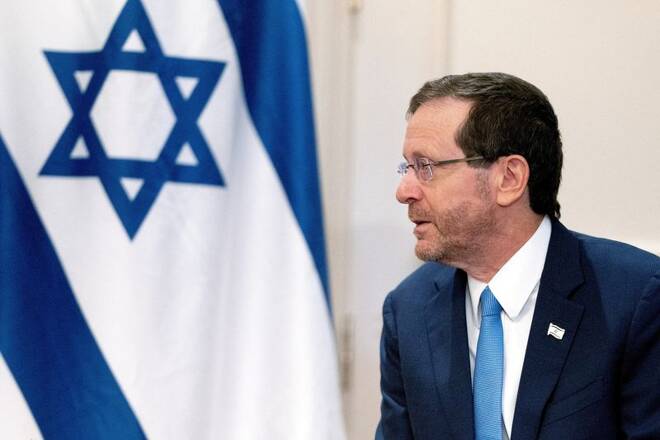Advertisement
Advertisement
Israeli president touts business ties on first Bahrain visit
By:
DUBAI (Reuters) - Bahrain's King Hamad bin Isa Al Khalifa met President Isaac Herzog on Sunday in the first visit by an Israeli head of state to the Gulf state since the countries forged ties two years ago and as a right-wing coalition government takes shape in Israel.
DUBAI (Reuters) – Bahrain’s King Hamad bin Isa Al Khalifa met President Isaac Herzog on Sunday in the first visit by an Israeli head of state to the Gulf state since the countries forged ties two years ago and as a right-wing coalition government takes shape in Israel.
Herzog, whose post is largely ceremonial, will then visit the United Arab Emirates, which also normalised ties with Israel in U.S.-brokered pacts known as the Abraham Accords and had already hosted the Israeli president.
“I have come here with a distinguished delegation of people who lead the business sector in Israel, who are eager to connect and do business with the people of Bahrain,” Herzog said according to a statement provided by his office.
King Hamad also voiced hope the visit would strengthen bilateral relations, state news agency BNA reported, while stressing Manama’s support for “a just, comprehensive and sustainable peace that guarantees legitimate rights of the Palestinian people”.
The incoming Israeli government under Benjamin Netanyahu after an election last month looks likely to include far-right politicians who oppose Palestinian statehood and want the Palestinian Authority, which wields limited self-rule in the West Bank, dismantled.
It includes ultra-nationalist Itamar Ben-Gvir who was among Israeli officials including Netanyahu attending UAE national day celebrations at the Emirati embassy in Tel Aviv on Thursday.
Sunni Muslim-ruled UAE and Bahrain broke with decades of Arab policy when they forged ties, in the absence of Palestinian statehood, with Israel in 2020 under Netanyahu’s leadership in deals partly driven by shared concerns over Shi’ite Iran’s nuclear and missiles programmes and growing regional sway.
(Reporting by Mayaan Lubell in Jerusalem and Nayera Abdallah in Cairo; Writing by Ghaida Ghantous; Editing by Alexander Smith)
About the Author
Reuterscontributor
Reuters, the news and media division of Thomson Reuters, is the world’s largest international multimedia news provider reaching more than one billion people every day. Reuters provides trusted business, financial, national, and international news to professionals via Thomson Reuters desktops, the world's media organizations, and directly to consumers at Reuters.com and via Reuters TV. Learn more about Thomson Reuters products:
Advertisement
